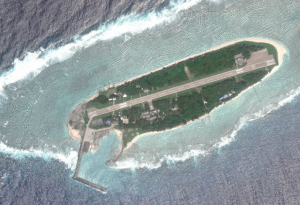As Philippine-China tensions continue near the Second Thomas Shoal, Taiwan is now facing its own South China Sea dilemma. While Taiwan’s South China Sea issue is currently a domestic political matter, the outcome could have regional effects.
Over the last several months, Taiwan lawmakers have publicly debated whether President Tsai Ing-wen should visit Itu Aba (Taiping Island in Mandarin) before her second term ends in late May. Itu Aba, the largest natural feature in the Spratly Island group, is under Taiwan’s control, but also claimed by China, the Philippines, and Vietnam. It hosts a contingent of roughly 200 Taiwanese coast guard servicemembers.
In January, lawmakers in the opposition party, the Kuomintang (KMT), began calling on Tsai to visit Itu Aba and reaffirm Taiwan’s sovereignty over the island. The calls followed vague answers on whether Tsai would preside over a Taiwan Coast Guard Administration (CGA) ceremony for the renovation of the wharf on Itu Aba. The CGA announced the completion of a $54.4 million dredging project aimed at deepening Itu Aba’s navigational channel but did not confirm whether Tsai would attend the opening ceremony.
In the end, the ceremony on March 26 went ahead without Tsai.
KMT politicians seized on her absence to accuse Tsai and her Democratic Progressive Party (DPP) of being unwilling to defend Taiwan’s sovereignty. Critics pointed out that the past two presidents – Chen Shiu-bian of the DPP and Ma Ying-jeou of the KMT – both visited Itu Aba near the end of their terms. KMT lawmakers continue to push for Tsai to make a trip to Itu Aba before she leaves office in May.
Former President Ma in particular supported KMT lawmakers’ demands by publicly disagreeing with the National Security Bureau (NSB) assessment that security concerns made such a trip unadvisable. “If former president Chen and I could handle these issues, so can President Tsai. It is not a technical issue that cannot be resolved,” he wrote in a Facebook post.
DPP lawmakers and Foreign Minister Joseph Wu countered last week by stating that it is not “an appropriate time” for Tsai to visit Itu Aba given the ongoing South China Sea tensions. Wu and NSB Director General Tsai Ming-yen both asserted that a presidential visit could undermine Taiwan’s ongoing diplomatic efforts and create the perception of Taiwan as a “regional troublemaker” given regional tensions.
DPP concerns are partially based on Vietnam and the Philippines claiming Itu Aba. Reaffirming sovereignty over Itu Aba could anger both nations, especially as Taipei and Manila further improve their ties. Visiting Itu Aba would thus hurt Taipei’s relations with important Asian neighbors just ahead of President-elect (and current vice president) Lai Ching-te beginning his term in May.
Additionally, an Itu Aba visit by Taiwan’s president could benefit China. Beijing’s claims in the South China Sea, including the “nine-dash line,” are based on the KMT’s December 1946 “eleven-dash line.” In Beijing’s official narrative, Taiwan – and all the territory its government controls – is rightfully part of the People’s Republic. China would potentially utilize a Tsai visit to validate its push to “jointly safeguard national sovereignty and territorial integrity and safeguard the overall and fundamental interests of the Chinese nation,” including the South China Sea.
As a sign of Beijing’s preferences, Chinese media outlets have criticized Tsai for not going, implying that she is disinterested in maintaining Taiwan’s claim to the island. One article pointedly warned that “any attempt to collude with external forces and betray the interests of the Chinese nation is playing with fire and will surely be spurned by the people on both sides of the Taiwan Strait and punished by history.”

































